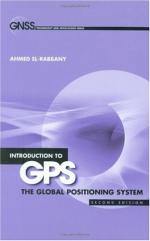|
This section contains 1,522 words (approx. 6 pages at 300 words per page) |

|
Most people have been lost at one time or another, but what if it were possible to know where you are, anywhere on Earth, 24 hours a day? The Global Positioning System (GPS) can give that information, and it is free to anyone with the proper equipment and a basic knowledge of mathematics.
In the 1980s, the U. S. Department of Defense designed GPS to provide the military with accurate, round-the-clock positional information. Twenty-seven satellites orbiting over 10,000 miles above Earth regularly send information back to Earth. A small piece of equipment, called a GPS receiver, uses this information to compute its position to within a few yards. GPS receivers used for surveying can find positions to within less than one centimeter.
The "constellation" of satellites above the Earth is constantly changing; each orbits Earth twice a day. At any given time there are enough satellite...
|
This section contains 1,522 words (approx. 6 pages at 300 words per page) |

|


